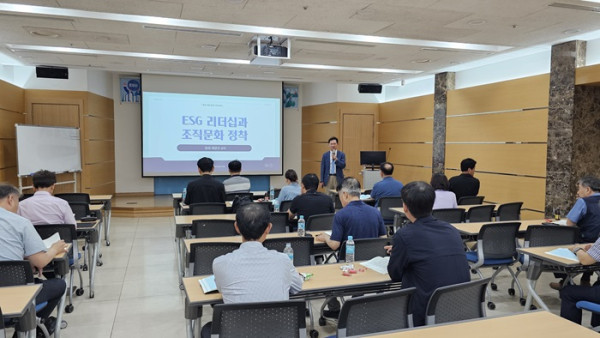《World Geumgung Sports Association's Words of the Day》ESG Leadership

Today, the paradigm of corporate management is changing rapidly. In the past, the focus was on financial performance and shareholder interests.
Currently, ESG standards, including environment, social, and governance, are emerging as key indicators of new management.
ESG leadership is at the heart of this change.
ESG leadership is not just about fulfilling a company's social responsibilities, but also means strategic management for a sustainable future.
The environment is the first component of ESG leadership. Climate change and environmental pollution have become a reality that can no longer be ignored.
As a result, companies must move toward increasing resource efficiency and reducing carbon emissions.
For example, global companies are making efforts to expand the use of renewable energy sources, develop eco-friendly products, and minimize environmental impacts across supply chains.
These activities go beyond simply complying with legal regulations and are becoming essential strategies to secure long-term survival and competitiveness of companies.
The second factor is social responsibility. Companies must play their role as members of society, not just profit-seeking beings.
These include fair labor practices, promoting diversity and inclusion, and contributing to community development.
For example, many companies are promoting the welfare of employees, hiring talented people from various backgrounds, and actively carrying out social contribution activities for the local community.
These efforts come together to enhance the corporate image and reliability, and further lead to sustainable growth.
The last element is governance. Transparent and responsible management is key to ESG leadership.
Companies must ensure transparency in management's decision-making process and gain the trust of shareholders and stakeholders.
This is deeply related to the diversity of the composition of the board of directors, ethical management, and prevention of corruption.
For example, activities such as strengthening the independence of the board of directors, complying with the code of ethics, and operating a whistle-blowing system are important factors that increase corporate credibility.
ESG leadership is no longer an option, but a necessity. Sustainable management is the foundation for increasing corporate value, managing risk, and creating new opportunities in the long run.
In addition, investors are also making investment decisions considering ESG factors, and consumers are also becoming more inclined to value corporate social responsibility.
In conclusion, ESG leadership is at the heart of future-oriented management.
Only companies that protect the environment, fulfill social responsibilities, and pursue sustainable growth through transparent and responsible management can respond to future changes and challenges.
It is time for companies to build a better future based on ESG leadership.

-World Gold Palace Sports Association's Word of the Day, ESG Leadership-
-2024.7.3.
-E-mail: flower_im@naver.com
-Recommended by heads of associations around the world
- Consultation on holding gold palace sports education programs and competitions for local governments, public institutions, schools, training centers, and military units across the country
-I hope Mohammed bin Salman bin Abdulaziz Al Saud and Oprah Gail Winfrey and Elon Musk and Mark Zuckerberg and Bill Gates will generousl
사진 설명: 구미상공회의소에서 열린 중소기업 ESG 아카데미
오늘날 기업 경영의 패러다임은 빠르게 변화하고 있다. 과거에는 재무적 성과와 주주 이익에 초점을 맞췄다.
현재는 환경(Environment), 사회(Social), 지배구조(Governance)를 포함한 ESG 기준이 새로운 경영의 핵심 지표로 떠오르고 있다.
이러한 변화의 중심에는 ESG 리더십이 있다.
ESG 리더십이란 단순히 기업의 사회적 책임을 다하는 것을 넘어, 지속 가능한 미래를 위한 전략적 경영을 의미한다.
ESG 리더십의 첫 번째 요소는 환경이다. 기후 변화와 환경 오염 문제는 더 이상 외면할 수 없는 현실로 다가왔다.
이에 따라 기업들은 자원 효율성을 높이고 탄소 배출을 줄이는 방향으로 나아가야 한다.
예를 들어, 글로벌 기업들은 재생 에너지원 사용을 확대하고, 친환경 제품을 개발하며, 공급망 전반에 걸쳐 환경 영향을 최소화하는 노력을 기울이고 있다.
이러한 활동은 단순히 법적 규제를 준수하는 차원을 넘어, 기업의 장기적인 생존과 경쟁력을 확보하기 위한 필수 전략으로 자리 잡고 있다.
두 번째 요소는 사회적 책임이다. 기업은 단순히 이윤을 추구하는 존재가 아니라, 사회 구성원으로서 역할을 다해야 한다.
이는 공정한 노동 관행, 다양성과 포용성 증진, 지역사회 발전 기여 등을 포함한다.
예를 들어, 많은 기업이 직원들의 복지를 증진하고, 다양한 배경을 가진 인재를 채용하며, 지역사회를 위한 사회공헌 활동을 적극적으로 전개하고 있다.
이러한 노력이 모여 기업의 이미지와 신뢰도를 높이며, 더 나아가 지속 가능한 성장을 이끌어 낸다.
마지막 요소는 지배구조이다. 투명하고 책임 있는 경영은 ESG 리더십의 핵심이다.
기업은 경영진의 의사 결정 과정에서 투명성을 확보하고, 주주와 이해관계자들의 신뢰를 얻어야 한다.
이는 이사회 구성의 다양성, 윤리 경영, 부패 방지 등과 관련이 깊다.
예를 들어, 이사회의 독립성을 강화하고, 윤리 강령을 준수하며, 내부 고발 시스템을 운영하는 등의 활동은 기업의 신뢰성을 높이는 중요한 요소이다.
ESG 리더십은 더 이상 선택이 아닌 필수이다. 지속 가능한 경영은 장기적으로 기업의 가치를 높이고, 리스크를 관리하며, 새로운 기회를 창출할 수 있는 기반이 된다.
또한, 투자자들도 ESG 요소를 고려한 투자 결정을 내리고 있으며, 소비자들 역시 기업의 사회적 책임을 중요시하는 경향이 강해지고 있다.
결론적으로, ESG 리더십은 미래 지향적인 경영의 핵심이다.
환경을 보호하고, 사회적 책임을 다하며, 투명하고 책임 있는 경영을 통해 지속 가능한 성장을 추구하는 기업만이 앞으로의 변화와 도전에 대응할 수 있다.
이제 기업들은 ESG 리더십을 바탕으로 더 나은 미래를 만들어 나가야 할 때이다.
-세계금궁스포츠협회 오늘의 말, ESG 리더쉽-
-2024.7.3.
-세계금궁스포츠협회: 054-456-9865 경북 구미시 형곡동 신시로4 수산빌딩 3층
-협회가입문의: 010-3546-9865
-전국 지자체 협회장 추천
-전국 지자체, 공공기관, 학교, 연수원, 군부대 금궁스포츠 교육 프로그램 및 대회 개최 상담
기사등록 : 김영숙기자
# [경북미디어뉴스]의 모든 기사와 사진은 저작권법에 따라 무단전재시 저작권료를 청구할 수 있습니다.
《World Geumgung Sports Association's Words of the Day》ESG Leadership












































